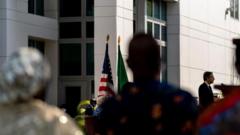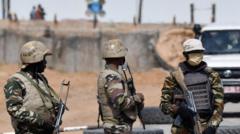As Haiti grapples with severe security challenges, a significant partnership with a controversial military contractor raises both hopes and concerns regarding efficacy and treatment of violence.
**Haiti Turns to Controversial Figures in War Against Gang Violence**

**Haiti Turns to Controversial Figures in War Against Gang Violence**
Amid escalating gang violence, the Haitian government enlists Erik Prince's private military expertise to combat criminal threats.
In a desperate move to restore order, the Haitian government has engaged Erik Prince, the founder of the notorious private military company Blackwater, to assist in its ongoing battle against rampant gang violence. This initiative, aimed at countering criminal groups that have been wreaking havoc throughout the country, has sparked a plethora of discussions around the implications and potential consequences of utilizing private military forces.
In recent months, the Haitian administration has embarked on a somewhat secretive mission to reinforce security measures, which includes deploying military drones operated by Prince's team within Port-au-Prince. Unfortunately, nearly three months into this operation, local authorities have yet to report any successful missions resulting in the capture or neutralization of high-profile gang leaders.
Compounding these issues is the wider strategy that involves not only drone surveillance but also enlisting a cadre of Haitian American military veterans—potentially numbering up to 150—who may soon be dispatched to bolster security efforts on the ground. Reports indicate that Prince has also supplied a significant shipment of arms to Haiti, intended to enhance the government's arsenal in tackling entrenched gang territory.
Despite American officials being privy to Prince’s contractual engagements with Haiti, specifics such as the financial arrangements remain undisclosed. The initiative has been met with a mixture of hope for stabilization and apprehension regarding the ramifications of relying on private military contractors in a complex socio-political landscape already stressed by violence and instability. As Haitian officials await further arms and reinforcements, many in the international community remain concerned about the trajectory of these developments and their potential impact on the country’s fragile state.
In recent months, the Haitian administration has embarked on a somewhat secretive mission to reinforce security measures, which includes deploying military drones operated by Prince's team within Port-au-Prince. Unfortunately, nearly three months into this operation, local authorities have yet to report any successful missions resulting in the capture or neutralization of high-profile gang leaders.
Compounding these issues is the wider strategy that involves not only drone surveillance but also enlisting a cadre of Haitian American military veterans—potentially numbering up to 150—who may soon be dispatched to bolster security efforts on the ground. Reports indicate that Prince has also supplied a significant shipment of arms to Haiti, intended to enhance the government's arsenal in tackling entrenched gang territory.
Despite American officials being privy to Prince’s contractual engagements with Haiti, specifics such as the financial arrangements remain undisclosed. The initiative has been met with a mixture of hope for stabilization and apprehension regarding the ramifications of relying on private military contractors in a complex socio-political landscape already stressed by violence and instability. As Haitian officials await further arms and reinforcements, many in the international community remain concerned about the trajectory of these developments and their potential impact on the country’s fragile state.























